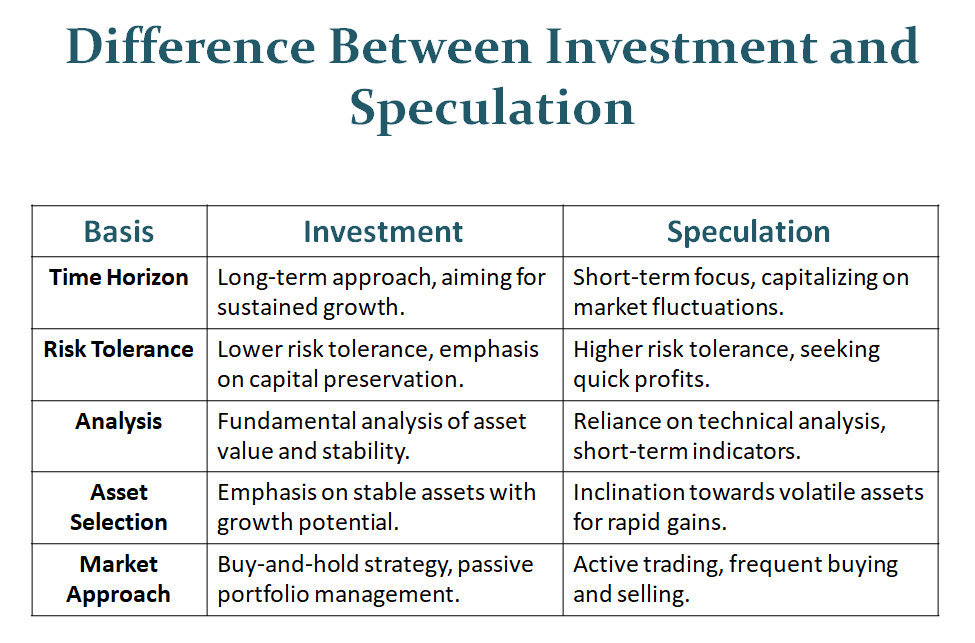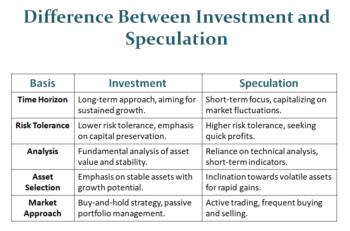Table of Contents:-
- Difference Between Investment and Speculation
- Meaning of Investment
- Definition of Investment
- Characteristics of Investment
The article highlights the meaning of investment and speculation while exploring the differences between investment and speculation. The fundamental difference between investment and speculation is that investment is made for the long term, while speculation aims for the short time. The post covers the main difference between these two approaches.
Difference Between Investment and Speculation
| Basis of Difference | Investment | Speculation |
| Meaning | Allocation of Funds for Asset Purchase | Engaging in short-term financial asset investments for quick gains. |
| Types of contract | An investor is the creditor of the investment | A speculator is an owner of the speculation |
| Method | Focuses on fundamentals, Research-driven. | Often based on sentiments or market trends. |
| Returns | Consistent and provides stable returns. | Variable, it could be very high or result in losses. |
| Length of Commitment | The length of commitment is long-term | The length of commitment is short-term |
| Deployment of Funds | An investor uses his funds. | A speculator uses borrowed funds. |
| Quantity of Risk | Risk is low | Risk is high |
| Stability of income | Stable | Uncertain and Erratic |
| Psychological Attitude of Participants | Investors’ psychological attitude is cautious and conservative. | The speculator’s psychological attitude is adoring and careless |
| Emotional State | less stressful. | It may involve significant stress due to volatility. |
| Intent to profit | Changes in value | Changes in prices |
| Reasons for purchase | It is a scientific analysis of intrinsic worth. | It is an unscientific analysis of intrinsic worth. |
| Decision Basis | Fundamental performance of the company. | Market trends, technical analysis, rumours. |
| Examples | Betting, development stocks, momentum contributing, foreign monetary standards, cryptocurrencies, digital forms of money. | The financial exchange, Stock market, shared assets, Government securities, factor contributing, saving accounts, and so on. |
Meaning of Investment
An investment involves the purchase of goods that are not consumed immediately but are used in the future to generate wealth. In finance, an investment refers to a monetary asset acquired with the expectation that it will generate income in the future or appreciate, allowing for a profitable sale. This can involve providing an advance loan or contributing to the equity or debt capital of a corporate or non-corporate business unit.
Investment may be defined as an activity that allocates funds in any financial or physical form in the present with the expectation of receiving additional returns.
The fundamental function of the financial market is to mobilize the investments required by corporate entities. Investment, in its broadest sense, refers to the sacrifice of current currency for future currency. Two different attributes are generally involved: risk and time. The rejection occurs in the present and is confident, while the reward comes later, if at all, and the premium amount is generally uncertain. In some cases, the element of time predominates (e.g., with government bonds), while in other cases, risk is the dominant factor (e.g., with call options on common stocks). Generally, investment means converting cash or money into a monetary asset or a claim on future capital for a return.
In finance, investment means acquiring a financial product or any other valuable asset with the anticipation of yielding favourable returns. In general terms, investment means the use of money with the hope of making more money.
In business, producers purchase physical goods, such as durable equipment or inventory, in the hope of improving future business.
Definition of Investment
According to the Oxford Dictionary, “Investment means the investing of money”.
According to an Individual Point of View, “Investment refers to a money commitment of some sort. For example, a commitment of money to buy a new car is certainly an investment”.
According to Keynes, Investment is defined as, “The addition to the value of the capital equipment which has resulted from the productive activity of the period”.
Characteristics of Investment
The following are the various characteristics of investment:
1) Rate of Return: The rate of return on investment for a period is defined as follows: Rate of return = (Annual income + (En * dingPrlce – BeginningPrice))/(BeginningPrice)
2) Risk: The risk of an investment refers to the variability of its rate of return. The greater the variability or dispersion of the possible outcomes or the broader the range of possible outcomes, the greater the risk.
Total risk of a security = Unsystematic risk + Systematic risk
Standard Deviation is used to measure unsystematic risk. Unsystematic risk is specific to the company and is reduced by diversification. Beta is used to measure systematic risk or Non-diversifiable risk that emanates or emerges from uncontrollable forces and is therefore not unique to the stock.
3) Marketability: An investment is considered highly marketable or liquid when:
- It can be transacted quickly.
- The transaction cost is low.
- The price change between two successive transactions is negligible.
High marketability is a desirable characteristic and low marketability is an undesirability of any company.
4) Tax Shelter: Some investments offer tax benefits, while others do not. Tax benefits can be categorized into three types:
- Initial Tax Benefit: It refers to the tax relief enjoyed at the time of investing.
- Continuing Tax Benefits: Tax shield associated with the periodic returns from the investment.
- Terminal Tax Benefit: It refers to relief from taxation when an investment is realized or liquidated.
5) Convenience: Convenience broadly refers to the ease with which an investment can be made and managed. The level of comfort associated with investments varies widely. At one end of the spectrum is the deposit in a savings bank account, which can be made readily and does not require any maintenance effort. At the other end of the spectrum is the purchase of a property, which may involve a lot of procedural and legal hassles at the time of acquisition and a great deal of maintenance effort.
6) Concealability: It is another essential characteristic of an investment. It implies that, to be safe from government confiscations, social disorders, or unacceptable levels of taxation, the investment must be concealable and leave no record of income received from its use or sale. Gold and precious stones have long been esteemed for these purposes because they combine high value with minimal size, making them easily transferable.
7) Capital Growth: It refers to the appreciation of investment. Capital growth has today become an essential characteristic of investment. It recognises the connection between corporation and industry development and tremendous capital growth. Investors and their advisers constantly seek ‘growth stock’ in the right sector and buy at the right time.
8) Purchasing Power Stability: It refers to the purchasing capacity of an investment within the market. Buying power stability has become one of the essential traits of investment. Investment always involves the commitment of current funds to receive more significant amounts of future funds.
9) Stability of Income: It refers to the consistent and reliable return from an investment. Another significant characteristic feature of the investment is the stability of income. The peace of income must look for a different path, just as the security of the principal. Every investor always considers the strength of monetary gain and the stability of the purchasing power of income.

